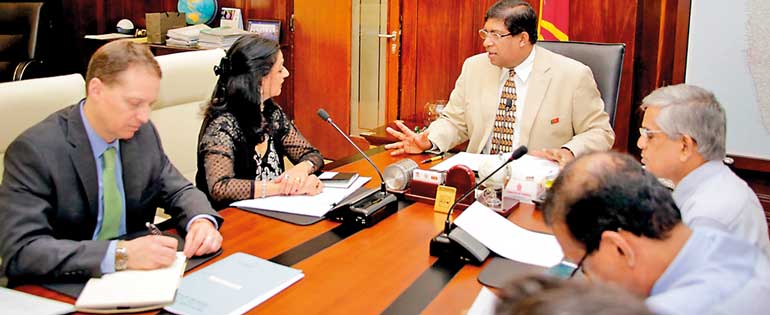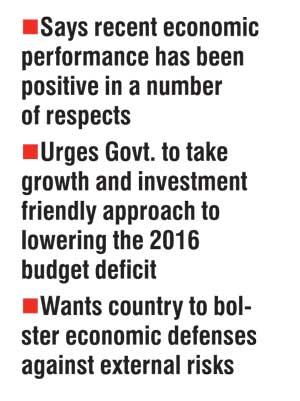Friday Feb 20, 2026
Friday Feb 20, 2026
Monday, 8 February 2016 00:00 - - {{hitsCtrl.values.hits}}

Finance Minister Ravi Karunanayake in discussion with the visiting IMF team led by Deputy Director in the Strategy, Policy and Review Department Kalpana Kochhar and IMF Mission Chief for Sri Lanka Todd Schneider on Friday
The International Monetary Fund (IMF) has expressed its satisfaction over the recent economic performance of Sri Lanka but 
insisted the country has to do lot more especially in terms of reducing the Budget deficit to better manage external and internal risks.
The fresh assessment follows conclusion of an IMF staff visit last week to discuss recent economic developments and policies for the year ahead. The team met with Government and Central Bank officials, as well as representatives of academia, civil society and the private sector.
The team issued the following statement today at the conclusion of its visit:
“Recent economic performance has been positive in a number of respects. Real GDP growth of 5.2% in the first three quarters of 2015 was achieved in the context of continued low inflation. Most sectors have shown positive growth, with particularly robust activity in tourism. Benefiting from low oil prices, the external current account balance has also narrowed to an estimated 2% of GDP by end-2015, compared with 2.6% in 2014.
“However, the government fiscal deficit for 2015 is estimated to have exceeded the original budget target. Based on the budget framework for 2016, IMF staff estimates suggest the fiscal deficit could widen further. Meanwhile, Sri Lanka’s public debt has risen to over 74% of GDP by end-2015. Despite the narrowing of the current account, capital outflows have intensified and the overall balance of payments deteriorated. These outflows were accompanied by downward pressure on the rupee and a decline in Central Bank gross foreign exchange reserves mainly due to short-term capital outflows as experienced in many emerging markets.
“These imbalances are also set against an increasingly less benign external environment. Key risks for emerging market and developing economies relate to a weaker global growth environment, market volatility, declining commodity prices, and tighter external financing conditions in the context of global rebalancing. Set against such risks, the mission emphasised the urgent need for Sri Lanka to bolster its economic defenses.
“Several steps have already been taken to move macroeconomic policies toward a more sustainable path. The Central Bank of Sri Lanka (CBSL) has allowed market forces a greater role in determining the level of the exchange in 2015, with the rupee depreciating by over 9%. Monetary policy was also tightened at the end of the year in light of rapid money and private credit growth, excess liquidity, and the deterioration in the external position.
“The mission has advised the government to urgently make a stronger effort to narrow the fiscal deficit and put the public finances on a sustainable path. While several measures in the budget (such as elimination of several special purpose levies, and the commitment to eliminate tax exemptions and bolster the efficiency of tax administration) are welcome, the mission highlighted the macroeconomic and financial risks of a large deficit and the associated need to borrow from domestic and international markets.
The mission urged the authorities to take a growth and investment friendly approach to lowering the size of the 2016 budget deficit—focusing mainly on measures to raise revenues by broadening the tax base, simplifying and making equitable the tax system, and improving tax administration, to lay the groundwork for further consolidation and debt reduction while also allowing for higher public investment.”
IMF said the end-of-mission press releases included statements of IMF staff teams that convey preliminary findings after a visit to a country. The views expressed in this statement are those of the IMF staff and do not necessarily represent the views of the IMF’s Executive Board. This mission will not result in a Board discussion.